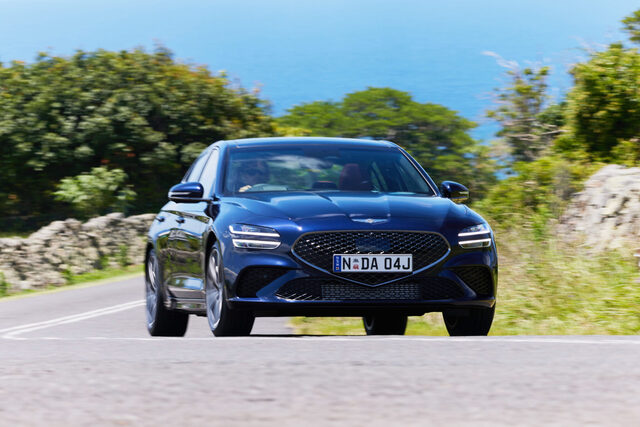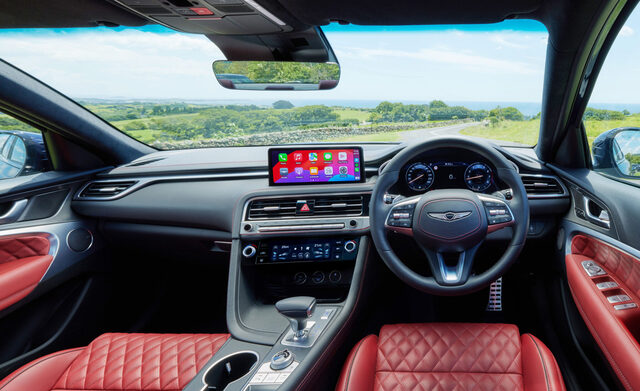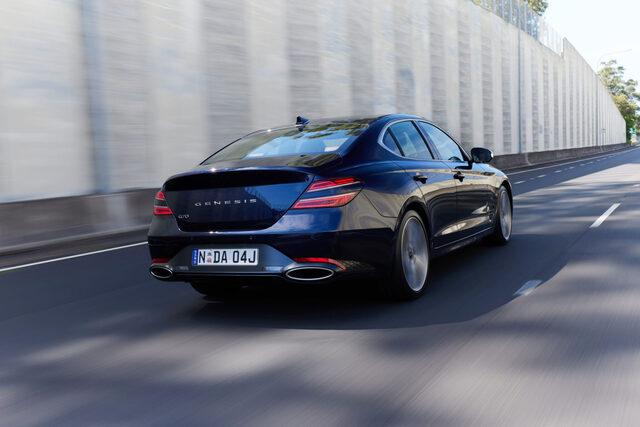Although it’s been on sale in overseas markets since 2016 and in Australia since 2019,
the Genesis brand remains largely unknown here.
During our week-long road test of the Genesis G70 we regularly had to explain that it was the luxury sub-brand of Hyundai, akin the relationship between Lexus and Toyota.
The G70 is a midsized sports sedan or station wagon, the latter variant coming with the rather ostentatious title of Shooting Brake. The name harks back to pre-automotive days and referred to horse-drawn carriages that were used for transporting aristocratic shooting parties and all their gear.
G70 competes against cars like the BMW 3 Series, Audi A4 and Mercedes-Benz C-Class.
The latest upgrade, launched in November 2023 added Intelligent Speed Limit Assist, Genesis Connected Services and Over The Air (OTI) software upgrade capability.
New generation Electronic Control Suspension provided enhanced ride and handling.
STYLING
The exterior of the G70 sedan is big and bold with neat cutouts for the wide-set LED headlights and black air intake vents. In line with the current sedan design trends it’s almost coupe-like in profile.
The MY2024 update added new emblems, redesigned wheels and additional exterior colours.
INTERIOR
The inside of the G70 oozes class and quality with quilted leather seats and door trim.
Front seat space is fine with good leg and headroom but legroom could be compromised if there are tallish rear seat occupants. A tall transmission tunnel effectively limits rear carrying capacity to a pair of adults.
We found front storage to be limited with a small centre console box, two cupholders and smartphone charger in the front not leaving room for other items like key fobs.
Boot capacity is a fairly modest 330 litres. The Shooting Brake extends it to 465 litres. Both have space saver wheels beneath the boot floor.
ENGINES/TRANSMISSIONS
Genesis G70 comes with the choice of two turbocharged petrol engines, a single-turbo four-cylinder 2.0-litre and twin-turbo 3.3-litre V6.
The 2.0 T-GDi, is a 2.0-litre four with direct fuel injection and a single, twin-scroll turbocharger that produces 179kW of power at 6200 rpm and 353Nm of torque from 1400 to 3500 revs.
The 3.3 T-GDi V6 has a capacity of 3.3 litres with direct fuel injection with twin single-scroll turbochargers. Peak power of 272kW comes in at 6000 rpm and maximum torque of 510Nm with a nice spread between 1300 and 4500 rpm so most drivers will have the engine at peak torque all the time.
Both engines require 95 RON petrol. Combined fuel consumption is listed at 8.7 litres per 100 kilometres for the 2.0T and 10.2 L/100 km for the 3.3T.
Power is transferred to the road in both models through an eight-speed automatic transmission and rear-wheel drive.
Both engines are Euro5 emissions compliant and run on 95 RON unleaded petrol. Fuel consumption is listed at 9.1 litres per 100 kilometres for the 2.0T and 10.4 L/100 km for the 3.3T.
INFOTAINMENT
Display is through an embedded 10.25-inch touchscreen that gives access to Radio Data System (RDS), satellite navigation SUNA live traffic updates; DAB+ digital radio; AUX/USB audio input; Bluetooth audio streaming; Apple CarPlay and Android Auto compatibility; Bluetooth phone connectivity; and wireless phone charging.
The 12.3-inch instrument cluster has full LCD display with 30 functions and three display themes.
There are four USB ports, single USB-A and USB-C in the front and two more USB-C in the rear.
Both models get a 15-speaker Lexicon by Harman system with a 660W 11-channel external digital amplifier and Quantum Logic Surround Sound.
SAFETY
Standard safety features in both Genesis G70 include 10 airbags, advanced ABS brakes with Brake Assist and Multi Collision Braking, Manual Speed Limit Assist, Forward and Reverse Parking Distance Warning and Rear View Parking Guidance,
The standard Genesis Active Safety Control system adds Blind-Spot Collision Warning,
Driver Attention Warning; Forward Collision-Avoidance Assist with pedestrian detection and lane-change oncoming function; High Beam Assist; Lane Keeping Assist; Rear Cross-Traffic Collision Avoidance Assist, Smart Cruise Control with Stop and Go function, and Surround View Monitor.
Pedestrian safety features add an active bonnet lift system and backup light guide function.
DRIVING
Genesis G70 shares a number of components, including the 3.3-litre engine, with the recently discontinued Kia Stinger.
While the G70 3.3T is aimed more at families than the sportier Stinger. Around town it’s like driving in a smallish limousine; smooth, quiet and comfortable.
G70 has five drive modes: Smart, Eco, Comfort, Sport and Custom settings.
In normal driving it’s at its best in Comfort rather than Sport because it still has plenty of grunt on offer.
On the open road we went for Sport, where the steering is sharp, tight and responsive. There is good low-end acceleration with only a mild hint of turbo lag.
Genesis G70 provides excellent levels of comfort and convenience for the driver with multiple powered seat and lumbar adjustment options including inflatable side bolsters that are automatically raised when the Sport Drive mode is engaged, and just as important for long-distance driving, lowered when reset to Comfort.
Both Genesis models have been tested in local conditions to come up with an Australian-specific chassis, suspension and steering settings.
Fuel consumption in the 3.3T is listed at 10.4 litres per 100 kilometres, we averaged 11.3 L/100km during our test. The 2.0T drops down to 9.0 L/100km.
SUMMING UP
During our week-long test the Genesis G70 impressed us with its styling and driving pleasure.
It’s a solid contender in the affordable premium-car field, although it’s doubtful that potential prestige car buyers see the South Koreans in the same light as the Brits and Germans.
RATINGS
Looks: 8/10
Performance: 8/10
Safety: 8/10
Thirst: 7/10
Practicality: 7/10
Comfort: 8/10
Tech: 8/10
Value: 7/10











